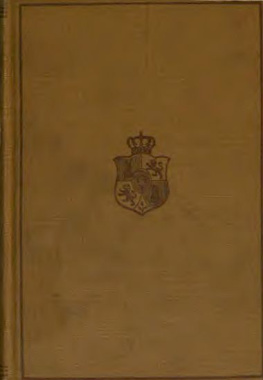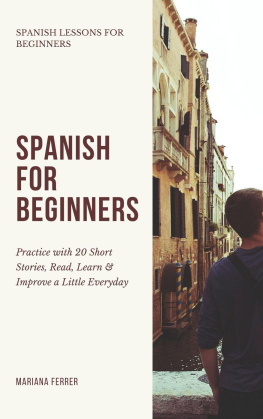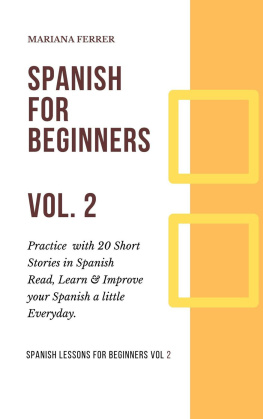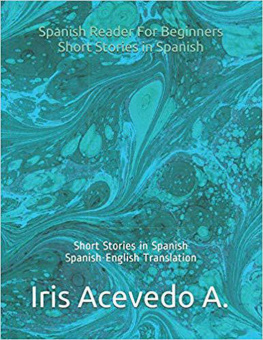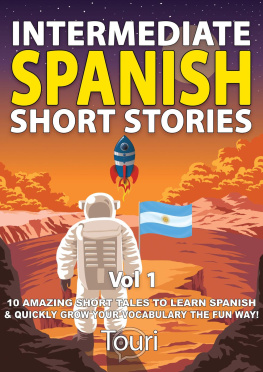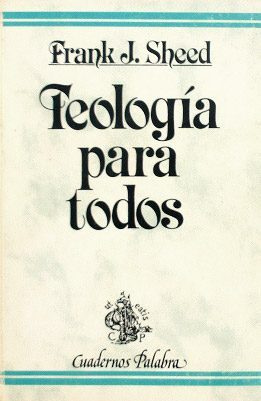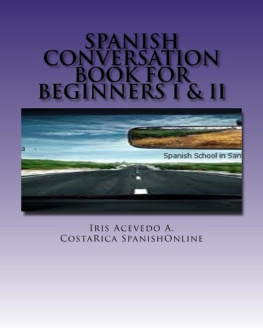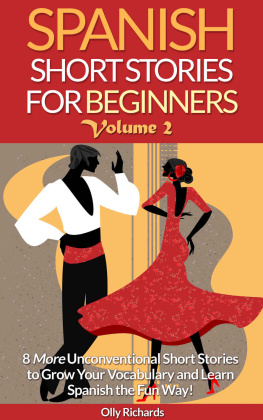Hills - Spanish Tales for Beginners
Aquí puedes leer online Hills - Spanish Tales for Beginners texto completo del libro (historia completa) en español de forma gratuita. Descargue pdf y epub, obtenga significado, portada y reseñas sobre este libro electrónico. Año: 2011, Editor: Project Gutenberg, Género: Historia. Descripción de la obra, (prefacio), así como las revisiones están disponibles. La mejor biblioteca de literatura LitFox.es creado para los amantes de la buena lectura y ofrece una amplia selección de géneros:
Novela romántica
Ciencia ficción
Aventura
Detective
Ciencia
Historia
Hogar y familia
Prosa
Arte
Política
Ordenador
No ficción
Religión
Negocios
Niños
Elija una categoría favorita y encuentre realmente lee libros que valgan la pena. Disfrute de la inmersión en el mundo de la imaginación, sienta las emociones de los personajes o aprenda algo nuevo para usted, haga un descubrimiento fascinante.
- Libro:Spanish Tales for Beginners
- Autor:
- Editor:Project Gutenberg
- Genre:
- Año:2011
- Índice:3 / 5
- Favoritos:Añadir a favoritos
- Tu marca:
- 60
- 1
- 2
- 3
- 4
- 5
Spanish Tales for Beginners: resumen, descripción y anotación
Ofrecemos leer una anotación, descripción, resumen o prefacio (depende de lo que el autor del libro "Spanish Tales for Beginners" escribió él mismo). Si no ha encontrado la información necesaria sobre el libro — escribe en los comentarios, intentaremos encontrarlo.
Hills: otros libros del autor
¿Quién escribió Spanish Tales for Beginners? Averigüe el apellido, el nombre del autor del libro y una lista de todas las obras del autor por series.
Spanish Tales for Beginners — leer online gratis el libro completo
A continuación se muestra el texto del libro, dividido por páginas. Sistema guardar el lugar de la última página leída, le permite leer cómodamente el libro" Spanish Tales for Beginners " online de forma gratuita, sin tener que buscar de nuevo cada vez donde lo dejaste. Poner un marcador, y puede ir a la página donde terminó de leer en cualquier momento.
Tamaño de fuente:
Intervalo:
Marcador:
The Project Gutenberg EBook of Spanish Tales for Beginners, by
Elijah Clarence Hills and various
This eBook is for the use of anyone anywhere at no cost and with
almost no restrictions whatsoever. You may copy it, give it away or
re-use it under the terms of the Project Gutenberg License included
with this eBook or online at www.gutenberg.org
Title: Spanish Tales for Beginners
Editor: Elijah Clarence Hills
Author: Various
Release Date: July 21, 2011 [EBook #36805]
Language: Spanish
*** START OF THIS PROJECT GUTENBERG EBOOK SPANISH TALES FOR BEGINNERS ***
Produced by Chuck Greif and the Online Distributed
Proofreading Team at http://www.pgdp.net (This book was
produced from scanned images of public domain material
from the Google Print project.)
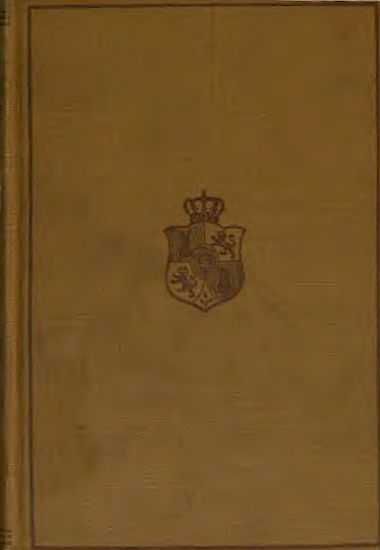
FOR BEGINNERS
EDITED WITH NOTES AND VOCABULARY
BY
ELIJAH CLARENCE HILLS, PH.D., LITT.D.
PROFESSOR OF ROMANCE LANGUAGES IN
INDIANA UNIVERSITY
REVISED EDITION
WITH DIRECT METHOD EXERCISES

NEW YORK
HENRY HOLT AND COMPANY
Copyright, 1909, 1919,
BY
HENRY HOLT AND COMPANY
[Please note that Spanish orthography has changed slightly since this book was written.
The words á and é are no longer accented.
(Note of etext transcriber)]
IN selecting these Spanish Tales for Beginners, three objects have been kept in view: (1) that they be good literature, (2) that they portray modern Spanish life, and (3) that they be interesting and not too difficult in language and thought. Some of the stories do not conform to all three rules,—the first two, for instance, do not portray modern Spanish life; but I hope that most of them will be found to conform fully. A few short lyric poems have also been included, since poetry forms an integral part of literature. Verse, moreover, is better for oral work and memorizing than prose.
Spain has a rich and varied literature, from which other nations have freely drawn,—a literature that gives true expression to the life and aspirations of the Spanish people. The selections in this volume are taken from literary works that have been written in the past fifty or sixty years, and although they are inferior in some respects to the great master-pieces of the sixteenth and seventeenth centuries, I believe that they have literary excellence, and they have, besides, the advantage of being written in the language of today and of describing present-day life.
It is my greatest wish that this volume may awaken the students' interest in the civilization of Spain, and that it may serve as an introduction to the study of Spanish literature.
The integrity of the texts has been preserved so far as the exigencies of a beginners' book permit, but the following changes have been made: (1) Some words or passages have been omitted, chiefly in the earlier stories. The parts thus omitted are, for the most part, digressions or uninteresting descriptive passages. Omissions have generally been marked by four suspensive points, or by three at the beginning of a story. Except at the beginning of a story, three suspensive points form a part of the punctuation of the several authors. (2) The orthography has been made to conform to that now prescribed by the Royal Spanish Academy. (3) In the earlier stories, le has been substituted for the feminine indirect object-pronoun la, and los for the masculine plural direct object-pronoun les. (4) And in the earlier stories, the conjunctive personal pronoun-object has been placed before the indicative verb: e.g., se tornó for tornóse, p. 11, l. 4. (5) The conjunction y has been added a few times to bridge over an omission: e.g., p. 2, l. 3. (6) In a few cases one word has been substituted for another: vieron for se apercibieron de que, p. 22, l. 11; la niña for la del rojo balandrán, p. 47, l. 13; Rogó for De esto á rogar, p. 48, l. 9; ese dinero for esos monises, p. 57, l. 31; cochero for auriga, p. 58, l. 4; reloj for calderómetro, p. 101, l. 7; otro pájaro for la escula-mata, p. 116, l. 9; madre for escula-mata, p. 116, l. 11.
In the notes the difficulties have been explained, so far as possible, by reference to the vocabulary, or by rearranging the words; but it has often been necessary to translate into English. Perhaps the criticism will be made that the notes to the first few pages are too numerous and too simple; but many of these notes, and especially those that explain elementary rules of Spanish grammar, are given for the benefit of students who begin to read almost from the first. In the notes to the lyrics, no attempt has been made to treat Spanish prosody fully; only a few rules are given, and these in the simplest language.
The vocabulary has been made as complete as possible. It contains many facts, such as descriptions of places and biographies of noted men, that are usually not given in vocabularies. It contains also all irregular verb-forms that occur in the first fifty pages of the texts.
I have pleasure in acknowledging my indebtedness to many of my colleagues for advice and helpful suggestions, and I am especially indebted to Dr. S. Griswold Morley for help in reading the proofs.
E. C. H.
COLORADO SPRINGS, COLO.
| PAGE |
| facing page |
| José Echegaray |
| Antonio de Trueba |
| María del Pilar Sinués |
| Manuela de la Peña Cuéllar |
| Enrique Pérez Escrich |
| Ernesto García Ladevese |
| Armando Palacio Valdés |
| Luis Taboada |
| Luis Taboada |
| Emilia Pardo Bazán |
| Emilia Pardo Bazán |
| Pedro Antonio de Alarcón |
| Armando Palacio Valdés |
| Antonio de Trueba |
| Julia de Asensi |
| Narciso Campillo |
| Fernán Caballero |
| Gustavo Adolfo Bécquer |
| POESÍAS |
|---|
| Iriarte |
| Iriarte |
| Samaniego |
| Felipe Pérez y González |
| Juan Eugenio Hartzenbusch |
| Juan Antonio Cavestany |
| Juan de Dios Peza |
| Antonio de Trueba |
| Fernán Caballero |
| José Zorrilla |
| Gaspar Núñez de Arce |
| Gustavo Adolfo Bécquer |
| Gustavo Adolfo Bécquer |
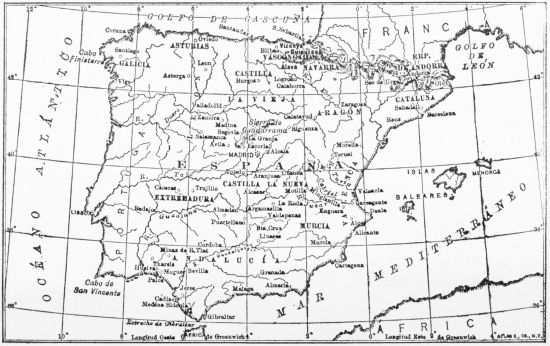
Map of Spain
[Medium sized]
[Large sized]
EL LEÓN, el rey de las selvas, agonizaba en el hueco de su caverna....
Á su lado estaba su hijo, el nuevo león, el rey futuro de todos los animales.
El monarca moribundo le daba penosamente el último consejo, el más importante.
—Huye del hombre—le decía:—huye siempre; no pretendas luchar con él.
Eres señor absoluto de los demás animales, no los temas; domínalos, castígalos, devóralos si tienes hambre.
Tamaño de fuente:
Intervalo:
Marcador:
Libros similares «Spanish Tales for Beginners»
Mira libros similares a Spanish Tales for Beginners. Hemos seleccionado literatura similar en nombre y significado con la esperanza de proporcionar lectores con más opciones para encontrar obras nuevas, interesantes y aún no leídas.
Discusión, reseñas del libro Spanish Tales for Beginners y solo las opiniones de los lectores. Deja tus comentarios, escribe lo que piensas sobre la obra, su significado o los personajes principales. Especifica exactamente lo que te gustó y lo que no te gustó, y por qué crees que sí.

